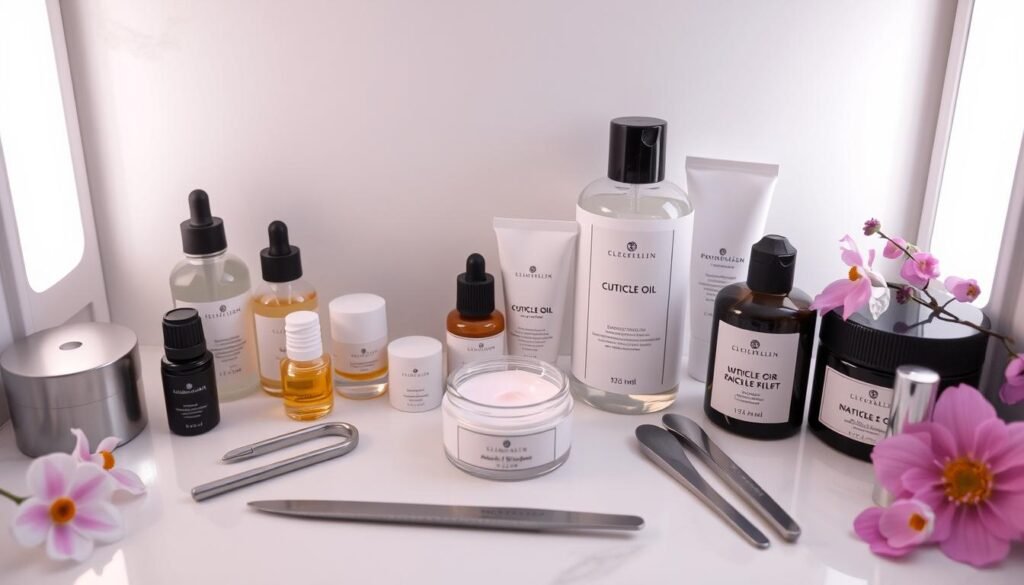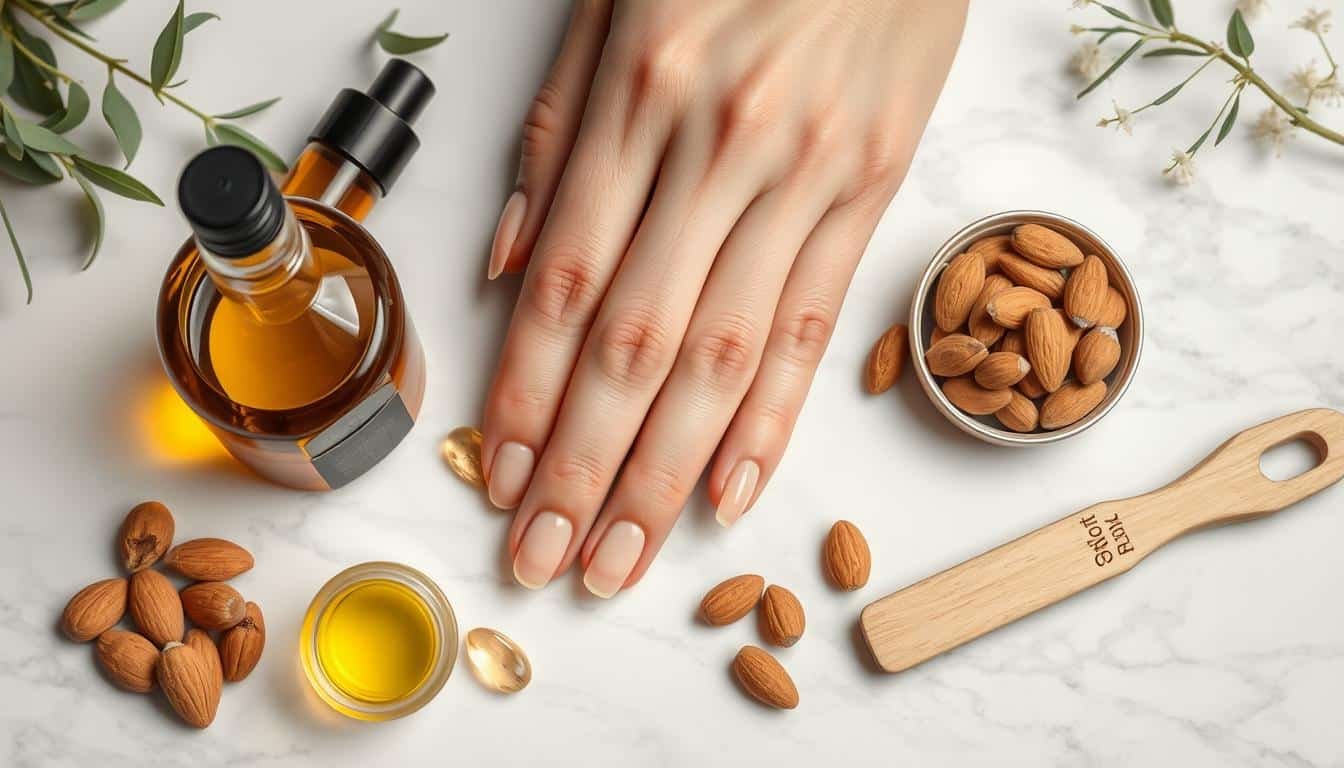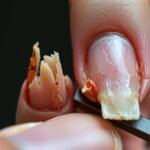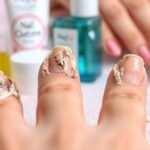Are your nails always breaking, peeling, or splitting? You’re not alone. Nail splitting, or onychoschizia, is common and can be annoying. But, you can stop it.
Split nails aren’t just a cosmetic issue. They can hurt and show health problems. For example, 40-50% of people with psoriasis have nail symptoms like splitting. Other health issues, like thyroid or liver disease, can also cause nail problems.
The good news? You can prevent split nails with the right care. This guide will show you how to keep your nails strong and healthy. We’ll cover the causes and how to prevent them.
Ready to say goodbye to brittle, splitting nails? Let’s explore nail health. We’ll learn how to prevent nails from splitting and keep them strong.
Key Takeaways
- Split nails can result from physical trauma, excessive moisture, or nutritional deficiencies
- Proper nail care, including keeping nails clean and dry, is crucial for prevention
- A balanced diet rich in iron, biotin, and zinc supports nail health
- Protecting nails from harsh chemicals and excessive water exposure is essential
- Regular moisturizing of nails and cuticles helps maintain nail strength
- Giving nails breaks from polish and using nail-friendly products can prevent damage
- Severe or persistent nail splitting may require medical attention
Understanding Split Nails: Causes and Risk Factors
Split nails can be a frustrating problem, especially for women. Harvard Medical School says 27 percent of women have brittle nails. Knowing the causes and risk factors is key to finding good remedies.
Physical Trauma and Injury
Protecting your nails from damage is important. Accidents like catching your fingers in doors can split your nails. Chemicals and water can also weaken them over time.
To strengthen weak nails, wear gloves when doing chores. Handle tools carefully to avoid injury.
Excessive Moisture Exposure
Too much moisture is bad for your nails. The American Osteopathic College of Dermatology (AOCD) says too much moisture makes nails soft and brittle. This can happen from using too many moisturizers or exposure to harsh chemicals like acetone.
Not enough moisture from washing hands too much or living in dry places can also cause brittleness.
Nutritional Deficiencies
Your diet affects your nail health. Iron deficiency or anemia can make nails brittle. Eating foods rich in iron like red meat or spinach helps.
Protein is also important for strong nails. The AOCD suggests biotin supplements to strengthen nails. About one-third of people see improvement after six months.
Nail growth is slow. Adults’ fingernails grow about 3.47 millimeters per month. It takes about 6 months for nails to grow out completely.
If home remedies don’t work, or if you have other symptoms like fatigue, see a healthcare professional. They can give you personalized advice for your nail health.
The Role of Proper Nail Care in Preventing Splits

Proper nail care is key to avoiding splits and keeping nails healthy. By following a few simple tips, you can keep your nails strong and beautiful.
Keeping nails clean and dry
Clean, dry nails are less likely to split. Dry your nails well after washing your hands. Wear gloves when your hands are wet, especially in winter.
Proper trimming and filing techniques
Trim nails straight across with sharp scissors or clippers. Then, round the tips slightly. File in one direction to avoid weakening the nail.
Moisturizing nails and cuticles
Apply hand lotion or nail products to nourish dry nails. Don’t forget your cuticles, as they protect the nail bed. Use nail oil to keep them hydrated and prevent splitting.
| Nail Care Tip | Benefit |
|---|---|
| Use acetone-free nail polish remover | Prevents nail dryness and brittleness |
| Apply a nail hardener | Strengthens nails and reduces splitting |
| Limit use of harsh nail products | Maintains natural nail health |
By following these nail care tips, you can prevent peeling nails and keep them strong. Remember, consistency is crucial in nail care.
How to Prevent Nails from Splitting: Essential Tips
Do you struggle with splitting nails? You’re not alone. Women face this issue twice as often as men, and it’s more common in people over 50. Let’s explore effective strategies to stop splitting nails and maintain optimal nail health.
First, protect your nails from excessive moisture. Prolonged water exposure weakens nails, especially in hard-water areas. Wear rubber gloves when cleaning or washing dishes. This simple step can significantly reduce nail damage.
Proper nutrition plays a crucial role in nail health. A study found that taking 2.5 grams of bioactive collagen peptides daily for 24 weeks improved nail growth and reduced cracks. Consider adding biotin-rich foods to your diet or talk to your doctor about supplements.
- Keep nails short to prevent catching and tearing
- Opt for rounded shapes instead of square or pointed
- Moisturize cuticles regularly with nourishing oils
- Use nail-strengthening treatments infused with biotin
Avoid harmful practices like peeling off nail polish or filing natural nails before applying acrylics. These actions can lead to thinner, weaker nails over time. Instead, use gentle, acetone-free removers and give your nails occasional breaks from polish.
“Nails are jewels, not tools.” – Nail care experts
Remember, prevention is key. By following these nail health advice tips, you can significantly reduce the risk of splitting nails and enjoy stronger, healthier nails.
Nutrition for Stronger Nails: Foods and Supplements

Eating right is crucial for nail health. A balanced diet can strengthen weak nails and moisturize dry ones. Let’s look at some foods and supplements that can improve your nail health.
Iron-rich Foods for Nail Health
Iron is essential for strong nails. Lean meats, beans, and spinach are great sources. Did you know most Americans eat meat every day? This helps meet their iron needs.
Men need 8 mg of iron daily. Women aged 19-50 should aim for 18 mg.
The Benefits of Biotin Supplementation
Biotin, or vitamin B7, is great for nail strength. You can find it in eggs, salmon, and almonds. A study found that 63% of people with brittle nails improved after taking 2.5 mg of biotin daily for 6-7 months.
While there’s no set RDA, adults should aim for at least 30 mcg per day.
Other Essential Nutrients for Nail Strength
Protein, omega-3 fatty acids, and vitamins A, C, and E are key for nail health. Eat colorful fruits and veggies for vitamin A. Blueberries and strawberries are good for antioxidants.
Bone broth offers collagen and protein. Even beer contains silicon, which can strengthen nails!
| Nutrient | Daily Recommendation | Food Sources |
|---|---|---|
| Iron | 8-18 mg | Lean meats, beans, spinach |
| Biotin | 30 mcg (minimum) | Eggs, salmon, almonds |
| Protein | 0.36 g per pound of body weight | Meat, fish, legumes, dairy |
| Omega-3 | 1.1-1.6 g | Fatty fish, walnuts, flaxseeds |
| Vitamin C | 75-90 mg | Citrus fruits, bell peppers, broccoli |
Remember, staying hydrated is key for nail health. Drink half your body weight (in pounds) in ounces of water daily. With these tips, you’re on your way to stronger, healthier nails!
Protecting Your Nails from Environmental Damage
Your nails are always exposed to things that can make them split, peel, and become brittle. To stop nails from peeling and keep them healthy, it’s important to protect them from harmful things. This section gives you easy tips to keep your nails safe from daily stressors.
Water can harm your nails. Washing your hands a lot or being in water for a long time can dry out your nails. This makes them more likely to break. To fight this, wear gloves when you do dishes or clean. After washing your hands, put on a moisturizer to keep your nails and cuticles moist.
Household cleaners and beauty products with harsh chemicals can weaken your nails. Try to use gentle, nail-safe options when you can. If you must use strong chemicals, wear gloves. Also, avoid using hand sanitizers with alcohol because they take away natural oils from your nails.
“Protect your nails like you protect your skin. They’re equally vulnerable to environmental damage.”
Cold weather is hard on nails. In the winter, wear gloves outside to protect your nails from dry, cold air. Also, use a humidifier inside to keep the air moist for your nails and skin.
For brittle nails, eating right is key. Eating foods rich in biotin, iron, and protein can make your nails stronger. Taking supplements can help, but talk to a doctor before starting any new supplements.
- Use gloves for household chores
- Moisturize nails regularly
- Choose gentle nail care products
- Protect nails in cold weather
- Maintain a nail-healthy diet
By following these tips, you can protect your nails from damage. This helps them stay strong and healthy. Remember, taking care of your nails every day is important to prevent problems and keep them looking good.
The Do’s and Don’ts of Nail Polish and Manicures
Proper nail care is key to preventing splits and maintaining healthy nails. Let’s explore some essential do’s and don’ts for nail polish application and manicures. This will help keep your nails strong and beautiful.
Choosing nail-friendly polish removers
When it comes to nail care tips, selecting the right polish remover is crucial. Opt for acetone-free removers with moisturizing oils to minimize drying effects. These gentle formulas help prevent nails from splitting while effectively removing polish.
About 91% of customers prefer longer-lasting manicures. This starts with proper removal techniques.
Proper application and removal techniques
To maintain nail health, apply a base coat before polish to protect nails from staining and damage. For optimal results, 83% of individuals who practice cuticle care experience fewer instances of chipped nail polish.
When removing polish, avoid picking it off, as this can weaken your nails. Instead, use a gentle remover and cotton pad to dissolve the polish.
Giving your nails a break from polish
To prevent nails from splitting, it’s important to give them occasional breaks from polish. Remove polish after five days and allow your nails to breathe for a few days before reapplying.
During this time, apply cuticle oil regularly – a practice recommended by 76% of nail professionals. This helps maintain nail strength and flexibility. Remember, healthy nails start with consistent care and attention to your manicure routine.
FAQ
What causes splitting nails?
How can I keep my nails from splitting?
What foods can help strengthen my nails?
How can I protect my nails from environmental damage?
What are some tips for using nail polish without damaging my nails?
Source Links
- Split Nail: Causes, Treatment, and Prevention – https://www.healthline.com/health/split-nail
- How to fix a split nail: Causes, treatment, and prevention – https://www.medicalnewstoday.com/articles/326008
- Fingernail do’s and don’ts – https://www.mayoclinic.org/healthy-lifestyle/adult-health/in-depth/nails/art-20044954
- Brittle nails: Causes, treatment, and nutrition – https://www.medicalnewstoday.com/articles/brittle-nails
- Brittle Nails: Causes, Treatment, and Prevention – https://www.healthline.com/health/brittle-nails
- Cracked Nails – https://www.webmd.com/skin-problems-and-treatments/cracked-nails-reasons
- Cracked Nails: Causes, Repair & Prevention – https://www.healthline.com/health/cracked-nails
- How Do Split Nails Happen—and What Can You Do To Fix It? – https://www.health.com/split-nails-8426080
- care-for-splitting-nails – https://www.essie.co.uk/tips-and-trends/care-for-splitting-nails
- 10 Foods You Should Eat If You Want Strong, Healthy Nails – https://www.freelandfoot.com/blog/the-10-best-foods-to-eat-for-healthy-nails.cfm
- Top 8 Vitamins and Nutrients for Healthy, Strong Nails – https://www.healthline.com/nutrition/vitamins-for-nails
- How Older Adults Can Manage Brittle Nails | Avon Health Center – https://www.avonhealthcenter.com/news/senior-health/how-manage-brittle-nails/
- Protect Your Nails From Damage In Cold Weather – https://suedesalonspa.com/blog-details/protect-your-nails-from-damage-in-cold-weather
- How to treat damaged nails, depending on your concern – https://kesterblack.co.nz/blogs/articles/gel-manicure-damage?srsltid=AfmBOoqG9iJ02SIplOJvmi1-Qn8E6GUxBfwEu2MbKHebQqIkIF_u4hca
- manicure-dos-and-donts-nail-article – https://www.essie.com/inspiration/tips-and-trends/manicure-dos-and-donts-nail-article
- THE DO’S AND DON’TS OF NAIL CARE – Shilena Nails & Spa – https://shilenanailsspa.com/body-care-tips/the-dos-and-donts-of-nail-care/
- THE ULTIMATE GUIDE TO CUTICLE CARE + DRY MANICURES!! – https://karanailedit.com/blogs/news/the-ultimate-guide-to-cuticle-care-dry-manicures








Im just saying, but cant we all agree that split nails are sometimes a fashion statement? Not all damage is bad, right?
Interesting read, but isnt biting nails a better solution? Stops the splitting and gives you something to do. Just food for thought.
Interesting article, but why not talk about diets impact on nail health? Surely what we eat matters more than moisture exposure, right?
Ever considered that not everyone obsesses over diets? Moisture impacts are universal. Food for thought!
Interesting read, but hasnt anyone thought maybe our nails are meant to split? Could it be a natural exfoliation process? Just food for thought.
I get the prevention part, but arent split nails sometimes just due to genetics? Can we really control everything? Just food for thought.
Interesting read but Im skeptical. Can too much moisturizer really cause split nails or is this just a ploy to sell breathable nail polish?
Skepticism is healthy, but dont disregard science. Over-moisturizing can indeed cause nail damage.
Interesting article, but isnt biting nails the real issue? Lets talk about that! Also, does lemon juice help with split nails? Just a thought.
Interesting read, but arent split nails just a sign of being a hard worker? Is avoiding physical labor the ultimate prevention trick?
Interesting tips, but are we sure nail splitting isnt just a sign of secret alien DNA activation? Just a thought… #outofthisworldnails.
Interesting theory, but lets stick to science, not science fiction. #realitycheck
Interesting read, but isnt nail splitting more genetic than related to moisture or trauma? Not all clumsy people have bad nails, right?